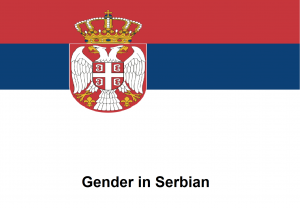Language/Serbian/Grammar/Gender
Jump to navigation
Jump to search
Rate this lesson:
Gender in Serbian (Rod imenice)
Hello Everyone, 😊
In today’s lesson we are going to study the following topic: GENDER in Serbian.
Please feel free to edit this page if you think it can be improved!
Happy learning!
The Serbian language has three genders:
- masculine (muški rod),
- feminine (ženski rod)
- and neuter (srednji rod).
If you want to know the gender of a noun one of solution is to look it up in the dictionary and remember it. But there are also some rules which can help you determine the gender of the noun:
Masculine Nouns
- masculine nouns usually end in a consonant (imenice muškog roda se obično završavaju konsonantom).
But
- some masculine nouns end in - o, and -e, usually masculine proper names. (neke imenice muškog roda se završavaju na -o i na -e, to su obično muška vlastita imena),
- some masculine nouns end in -a (neke imenice muškog roda se završavaju na -a )
Examples
- prijatelj (friend),
- lekar (doctor),
- učitelj (teacher),
- otac (father),
- sin (son),
- deda (grandfather),
- prozor (window),
- mrav (ant),
- lav (lion),
- slon (elephant)
- kamen (stone),
- Marko,
- Slavko,
- Djordje (proper names),
- sudija (judge),
- vođa (leader).
Feminine Nouns
- feminine nouns usually end in - a, (imenice ženskog roda se obično završavaju na -a).
Examples
- žena (woman),
- majka (mother),
- baka (grandmother),
- ćerka (daughter),
- olovka (pen),
- mačka (cat),
- kiša (rain),
- suknja (skirt),
- žirafa (giraffe),
- lutka (doll),
- lopta (ball),
- sveska (notebook),
- knjiga (book),
- trava (grass)
Neuter Nouns
- neuter nouns end in -e and -o, (imenice srednjeg roda se završavaju na -e i - o)
Examples
- dete (child),
- more (sea),
- selo (village),
- ime (name),
- pile (chicken),
- cveće (flowers),
- polje (field),
- jezero (lake),
- pero (feather),
- lišće (leaves),
- ćebe (blanket),
- drvo (tree),
- sunce (sun),
- jagnje (lamb).
How to determine the Gender of a Noun
- Feminine singular noun can never end in -o or -e, and neuter singular noun can never end in -a or a consonant.
Also this can help you determine the gender of the noun:
| jednina (singular) | množina (plural) |
|---|---|
| taj (muški rod, masculine) | ti |
| ta (ženski rod, feminine) | te |
| to (srednji rod, neuter) | ta |
Example
- taj mrav - ti mravi
- ta lutka - te lutke
- to dete - ta deca

